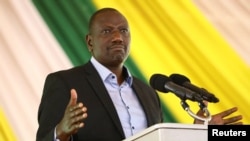Ruto said that keeping the country in a constant electioneering posture was "against the public interest," claiming that the uncertainty would further harm Kenya's struggling economy, which is already dealing with high inflation.
The election commissioner announced Deputy President William Ruto had won the election by a slight margin, but four of the seven election commissioners disagreed, claiming that the results had not been tabulated in a transparent manner.
Raila Odinga, Kenya's veteran opposition leader, called the country's presidential election results a "travesty," filing a case with the Supreme Court on Monday to challenge Ruto's victory.
Odinga's team argues that the head of the Independent Electoral and Boundaries Commission (IEBC), Wafula Chebukati, neglected to count roughly 140,000 votes, according to a copy of the 72-page appeal obtained by AFP.
The constitutional standard required for a presidential candidates to be declared the winner is to have of 50 percent plus 1 of the valid votes cast.
Odinga said in a tweet, "figures announced by Mr. Chebukati are null and void and must be quashed by a court of law."
In response, Ruto said in an affidavit to the court that Odinga had a history "of consistently disputing presidential election results and fomenting national crises after losing."
The ball is now in the hands of the Supreme Court, which must rule by September 5. If they order a re-vote, it must be held within 60 days.










